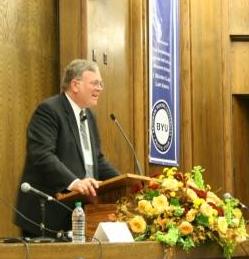Durham: We Can Be Repairers of the Breach, Restorers of the Paths to Dwell In

The Eighteenth Annual International Law and Religion came to a close in a plenary session on Tuesday afternoon, October 4, 2011. Center Director Professor W. Cole Durham, Jr. invited seven Symposium delegates and one audience member to join him in summarizing the event for all assembled in the Law School’s Moot Court Room and listening in via live Internet stream. Joining Professor Durham during this hour were
- David Rodearmel – U.S. Foreign Services Officer, currently assigned to Stuttgart, Germany, former Symposium delegate, this year an audience member;
- Mariatu Bangura – Senior Executive, Gender and Children’s Affairs, Ministry of Social Welfare, Sierra Leone;
- Justice Anthony Penrose Randerson – Justice, Court of Appeals, New Zealand;
- Eugenio Cedeño Areché – Deputy, National Congress, Chamber of Deputies, and President, Human Rights Commission, Dominican Republic;
- Brian Grim – Director of Cross-National Data and Senior Researcher in Religion and World Affairs, Pew Research Center’s Forum on Religion and Public Life;
- Vicente Lines – Attorney at Law, Costa Rica;
- The Reverend Thomas Philips – Member of the Malaysian Consultative Council of Buddhism, Christianity, Hinduism, Sikhism, and Taoism;
- Jorge Horacio Gentile – Professor of Constitutional Law and Director, Universidad Católica Argentina; Argentine Council for Religious Liberty (CALIR).
Echoing the sentiments of many, Mr. Rodearmel said he was struck in attending Symposium events this year by how we have some distance to go yet in formulating mutually agreed upon international standards on religious freedom. “But encounters such as this one help greatly along that road, in making that journey.”
The problems, observed Minister Bangura, are not with belief, not with religion. The problems are cultural and political. What is needed in each nation, she said, is what they have in Sierra Leone: a “melting pot” to mediate differences, a national religious council for engaging in interreligious dialogue. A Christian with a Muslim husband and Christian children, and parents who are one Christian and one Muslim, Ms. Bangura sees a hopeful future if people of all faiths can engage in meaningful, productive, and tolerant dialogue. She was touched, she said, at the way the students and hosts at the Symposium served the delegates. “As delegates, we should take that home with us, it should be part of us. I’m going to take all of what I have learned here to my country. From what I have learned here, I believe I will be in a position to influence, to give advice as to how we can improve.”
Taking up the theme of mutual understanding and tolerant dialogue, Professor W. Cole Durham, Jr., Director of the International Center for Law and Religion Studies, Symposium’s the sponsoring organization, spoke of a rapidly changing world in which “we can’t begin to imagine what the future is going to be like.” We do, however, “know some fundamental things. We know that human beings have spiritual sensitivities. We have questions about the meaning of life; about whether there is a life beyond; about how to find happiness and fulfillment; about how to build good and harmonious societies; about how to achieve justice and avoid evil. We also can be sure that human creativity and freedom will find differences with those characteristics in human beings and will find different answers to these fundamental questions, and as a result, we, our children, and our children’s children will live in a pluralistic world.”
This means, said Durham, “that those of us engaged in the work of trying to understand the relationship of religion, law, and society will not run out of work … and the contributions we can make will become more and more important.” What is crucial in the future “is not that we have the same views, but that we know that we will protect each other in our right to have our own views. For this we will need wisdom, including the wisdom religious traditions, “teaching us to care about others.”
Professor Durham closed his remarks with reference to the kind of religious practice “really wanted by God,” a described in scriptural passage, from Isaiah 58: “to undo the heavy burdens, and to let the oppressed go free, and that ye break every yoke.” That, said Durham, is “part of what religion should really be about. And then there’s a promise that comes to those who do that: it says they will be able to ‘build the old waste places; [they will] raise up the foundations of many generations; [they will be] The repairer of the breach, The restorer of paths to dwell in.'”
In our society we face a great many breaches, breaches of faith and rupture of relationships, said Durham. “But what I think is vital for us to do is to learn how to undo heavy burdens in each of our societies. I’ve come to know that people who come to this conference, each in their own way, in their own lives and their own traditions play significant leveraging roles in their societies to that end. And I’m convinced that and I’ve seen it at different places in the world—many places—that we can repair these breaches and that we can be restorers of paths to dwell in. I thank you for your participation and thank you for your work in support of that great cause.”